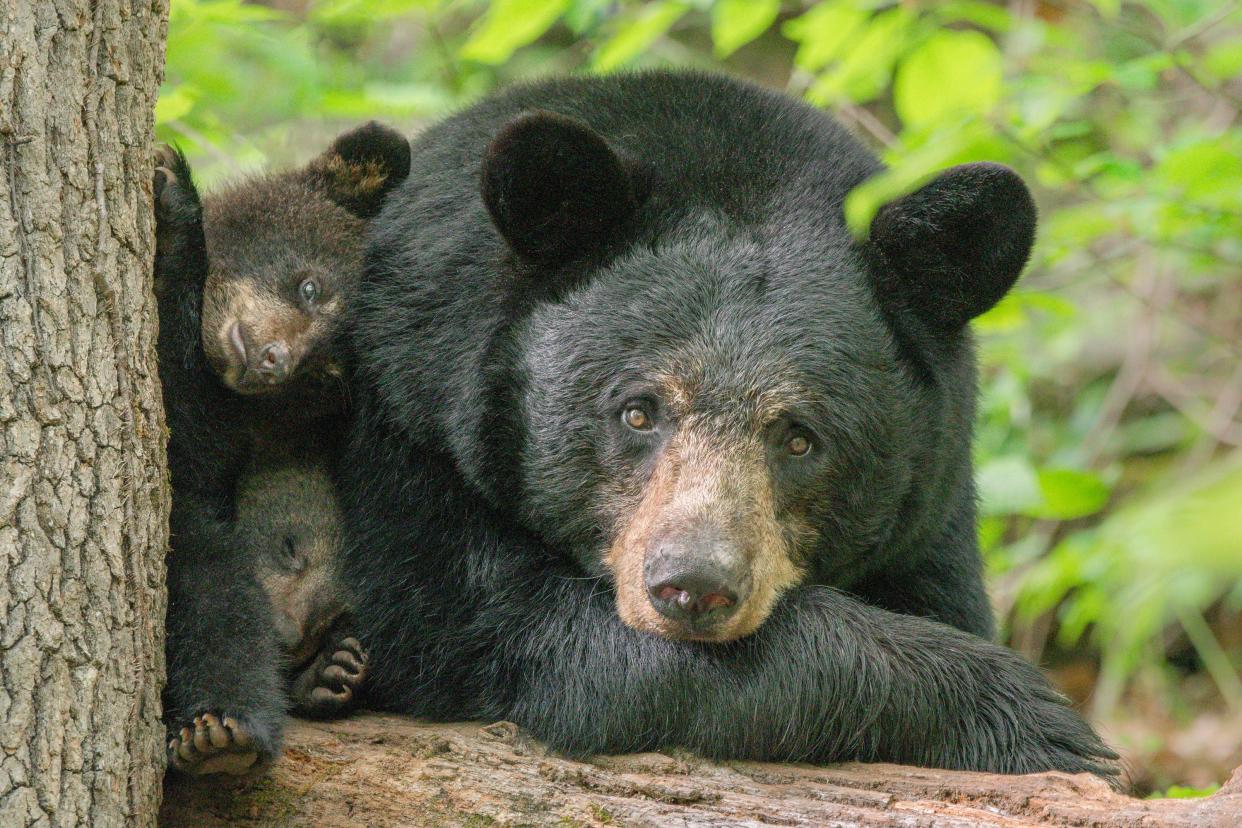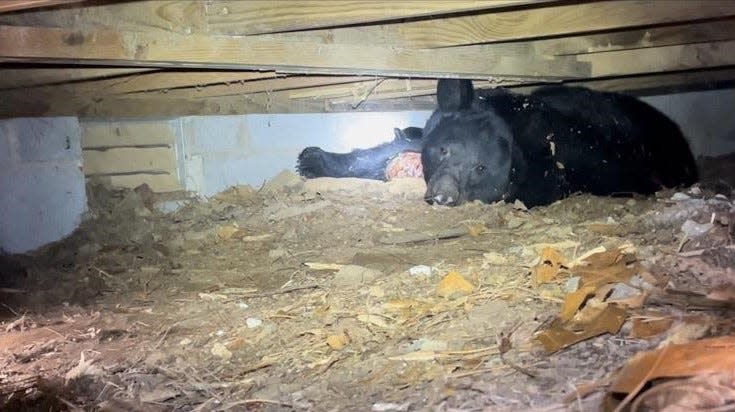Got a black bear den under your Asheville home? NC Wildlife Commission: Tips on what to do

ASHEVILLE — This winter hibernation season, bears have been spotted denning under houses and porches around Asheville, spurring the N.C. Wildlife Resources Commission to send out a reminder on what to do if someone spots a slumbering bear close to home.
The phenomenon of bears choosing a dark, urban place to shelter in the winter has been on the rise, according to Justin McVey, district wildlife commission biologist for the Asheville area.
"In the past 12 years, I've definitely seen an uptick in bears under houses and porches," McVey told the Citizen Times by email Feb. 28. "This year we had one under a handicap ramp at a business and we have a few under houses and porches."

Bear dens come in all shapes and sizes, according to the wildlife commission, and can be found in both wooded areas and developed areas, including neighborhoods and even downtown Asheville.
Downtown bear video: Video: Black bear takes stroll outside City Hall in downtown Asheville, spooks tourists
"Bears have even been known to slumber in backyard brush piles, under decks and in crawl spaces," the wildlife commission said in a recent news release. "Black bears also use rock and tree cavities and excavations under fallen trees, or they build ground nests for their long winter nap."
@NCWildlife biologists say: If you encounter a bear den, remain calm, leave the area quickly and quietly, and do not disturb the den for the rest of the winter season.
Read more: https://t.co/tyI1aL5lqz pic.twitter.com/mOBixM5z1V— N.C. Wildlife (@NCWildlife) February 23, 2024
McVey said bears usually begin denning in mid-December and come out again toward the end of March or beginning of April. But, at least in the Asheville area, some bears may make an appearance sooner if the weather is right — such as WNC's unusually warm February.
"In our area because of the abundance of food, like trash and bird feeders, bears don't really need to hibernate so it's pretty common to see them out and about on a warm day," McVey said.
Why we see bears in neighborhoods: Answer Woman: Why do we see black bears in Asheville neighborhoods? Are bears threatened?
However, the warm weather doesn't make a difference to the momma bears around town. The timing of when female bears exit hibernation depends on cub development, so warm weather wouldn't make them appear earlier, McVey said. Since all cubs are born in January or early February, female bears emerge with cubs around late March and early April.
Statewide, the wildlife commission estimates a population of 20,000 bears, with between 8,000 and 9,000 bears living in the mountains of Western North Carolina. The population in the mountains continues to rise by 3-5% annually, Special Projects Biologist Ashley Hobbs previously told the Citizen Times.
Asheville's urban bears, as previously reported in the Citizen Times, are twice as big and are having cubs at half the age of their rural counterparts. The North Carolina Urban/Suburban Bear Study, which began in in 2014 and concluded on June 30, 2023, gathered data on 131 yearling female black bears, with urban bears studied in Asheville being the heaviest.
Development impact on wildlife: Answer Man: Asheville Wildlife impacted by large development? What happens to wildlife?
Climate change and bear hibernation: Answer Woman: Is climate change keeping Asheville black bears awake during hibernation?
Bear denning under your deck? What to do
If anyone finds a bear under houses or decks, the wildlife commission recommends staying calm, leaving the area quickly and quietly, and trying not to disturb the den for the rest of the winter season. Den spotters should also call NCWRC's Human Wildlife Interaction hotline at 866-318-2401, McVey said.
But that doesn't mean the wildlife commission will evict the bear.
"Given the time of year, if we can’t confirm it is a male, we try to convince the homeowner to leave the bear alone," McVey said. "Evicting a female bear with cubs could cause her to abandon her cubs. While we have licensed cub rehabilitators, cub survival and success are much better with mom."
If a cub is determined to be orphaned in a den, commission staff will capture and bring it to one of their licensed bear cub rehabilitation facilities and eventually release it back into the wild. The wildlife commission has been rehabilitating and releasing orphaned black bear cubs since 1976 in one of the county's first cub rehabilitation programs, the release said.
Proposed extension to bear hunting: NC Wildlife proposes WNC bear, deer hunting season changes, hunting under influence rules
More on urban bears: Bears in downtown Asheville aren't going anywhere; here's what to do if you see one
The commission also promotes "BearWise" practices and safety tips:
Never feed or approach bears.
Secure food, garbage and recycling.
Remove bird feeders when bears are active.
Never leave pet food outdoors.
Clean grills and store them in a protected area.
Alert neighbors to bear activity.
Ryley Ober is the Public Safety Reporter for Asheville Citizen Times, part of the USA Today Network. Email her at rober@gannett.com and follow her on Twitter @ryleyober
This article originally appeared on Asheville Citizen Times: Black bear dens found under Asheville homes this winter
